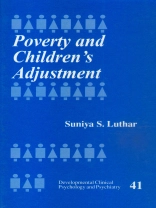In this important little book, Suniya S. Luthar synthesizes, with impressive clarity, three decades of research about children in poverty, their families, and their communities. She has created a compelling primer for the policy-makers, advocates, and students that, while not minimizing the challenges, suggests research-based opportunities and directions for real-world interventions. –Jane Knitzer, Columbia University, New York ‘Poverty has left a residue of rampant, destructive problems in America today, not the least of which are its draining, restrictive effects on the young. This important volume coalesces current knowledge, from multiple domains, about factors that protect poor children and youth against the ravages of poverty, or act to exacerbate its effects. Highlighting the thesis that the negative effects of poverty need not be inevitable, the volume offers scholarly, up-to-date reviews of the state of knowledge about the complex child, family milieu, and environmental variables that operate protectively in the face of poverty. The volume productively weds careful scholarship with caring consideration of the pressing, practical, poverty-spawned problems that confront society today. More than just cataloging problems, however, it delineates steps needed in any systematic campaign to reduce poverty′s disastrous effects.’ –Emory Cowen, Ph.D., University of Rochester ‘Up-to-date, concise, and well-written, this book offers a thorough and thoughtful analysis of the impact of poverty on the social and emotional functioning of children. Looking at both risk factors and protective influences (the ‘mediators and moderators of adverse life circumstances’), the author critically and effectively integrates and synthesizes past and recent research in a form useful to both researchers and clinicians. Findings are viewed through a lens of culture and context, broadening and expanding our understanding. Attention is paid to the adaptive capacities of children who, with family, community, school, and thrive in spite of (or in response to) difficult early experiences. Highly recommended!’ –Steven Friedman, Ph.D. & Donna Haig Friedman, Ph.D. Center for Social Policy, Mc Cormack Institute for Public Affairs, University of Massachusetts, Boston This book presents a comprehensive description of child, family, and community-level forces that modify the outcomes of youngsters experiencing conditions of poverty. Integrating a vast and complex array of research findings, the author elucidates salient underlying mechanisms via which poverty-related factors can affect poor children′s social and emotional development. In cohesive closing discussions, findings regarding major risk and protective forces are synthesized while delineating major directions for future work in research and theory development, teaching, and interventions and social policy. This timely and thorough volume is essential reading for students, researchers, and educators, as well as clinicians and policymakers concerned with understanding and promoting the positive development of children contending with family poverty.
Inhoudsopgave
Introduction
Child Attributes
Poverty and the Family
Demographic and Structural Features
Poverty and the Family
Psychological Processes
Exosystemic Influences
Future Directions
Over de auteur
Suniya S. Luthar is Professor of Clinical and Developmental Psychology at Columbia University’s Teachers College. She received her Ph.D. from Yale University in 1990. Dr. Luthar′s research involves vulnerability and resilience among various populations including youth in poverty and children in families affected by mental illness. Her recent work has focused on children in affluent communities, and her findings on problems among these youth—particularly pertaining to substance use and anxiety—have received much attention in the scientific community, among parents and school administrators, and in the national media.
In addition to numerous peer-reviewed journal articles, Dr. Luthar’s books include Children in Poverty: Risk and Protective Forces in Adjustment; Developmental Psychopathology: Perspectives on Adjustment, Risk, and Disorder; and most recently, Resilience and Vulnerability in Childhood: Adaptation in the Context of Adversities. Dr. Luthar is Associate Editor of Developmental Psychology and Development and Psychopathology. She has served as Chair of a grant review committee at the National Institutes of Health and is currently a member of the Governing Council of the Society for Research on Child Development, and of the American Psychological Association′s Committee on Socioeconomic Status. For her distinguished contributions to science, she has been recognized as a Fellow of the American Association for Psychological Science (APS) and has received several awards including a Dissertation Award, and the Boyd Mc Candless Young Scientist Award, both from the American Psychological Association, a Research Scientist Development Award from the National Institutes of Health, and an American Mensa Education and Research Foundation Award for Excellence in Research on Intelligence.












